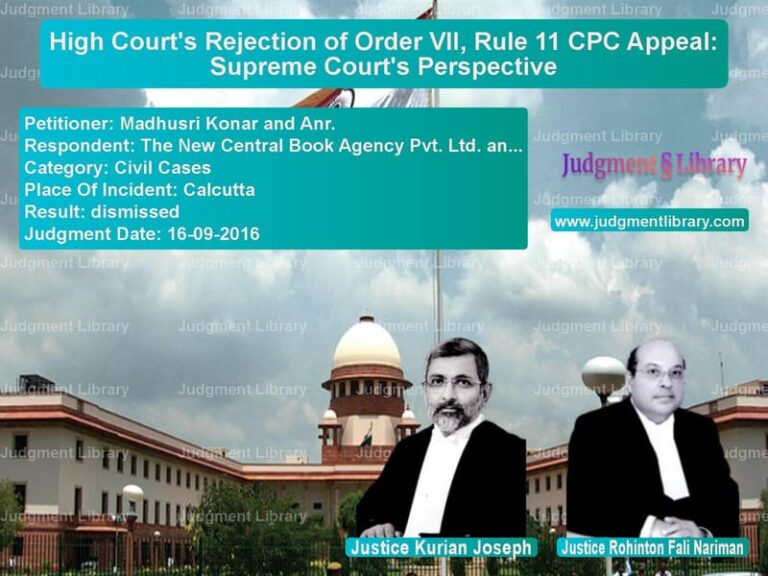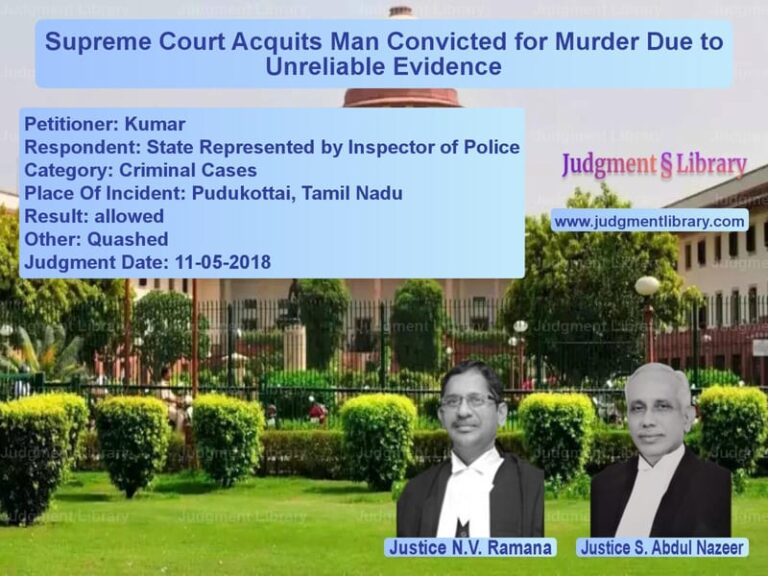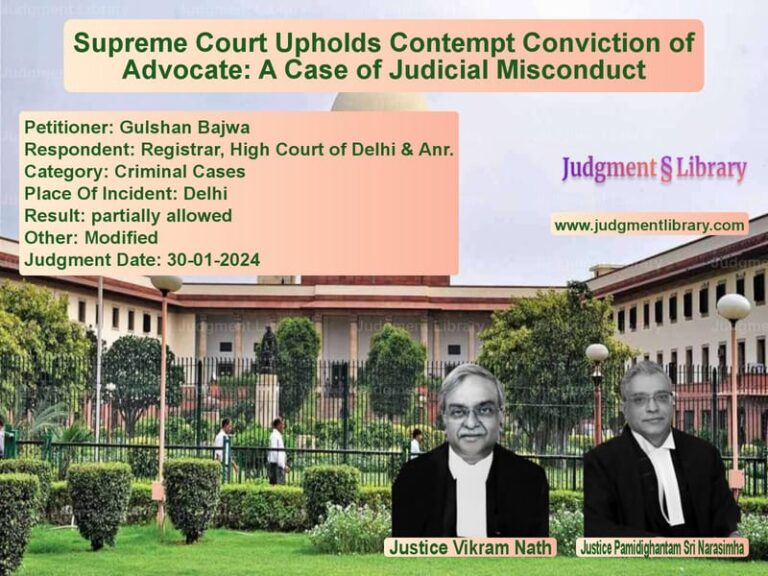Supreme Court Rules on Stamp Duty: Rajasthan Can Levy Duty on Insurance Policies
The Supreme Court of India has delivered a crucial verdict in Life Insurance Corporation of India v. State of Rajasthan & Ors., upholding the power of the State of Rajasthan to levy and collect stamp duty on insurance policies issued within its territory. The judgment clarifies the interpretation of the Indian Stamp Act, 1899, as adapted by Rajasthan, and addresses legislative competence under the Constitution.
Background of the Case
The case arose when the Life Insurance Corporation of India (LIC) was directed by the Rajasthan government to pay stamp duty on insurance policies issued within the state between 1993-94 and 2001-02. LIC had purchased insurance stamps from Maharashtra instead of Rajasthan, which led to a show-cause notice demanding Rs. 1.19 crore in unpaid stamp duty.
- In 2004, the Additional Collector (Stamps), Jaipur, upheld the demand and ordered LIC to pay the outstanding amount.
- LIC challenged this in the Rajasthan High Court, which dismissed the appeal and upheld the state’s authority to collect stamp duty.
- LIC then moved the Supreme Court, arguing that the state lacked legislative competence to impose stamp duty on insurance policies.
Arguments by the Petitioner (LIC)
- LIC argued that under Entry 91 of List I (Union List), only Parliament has the power to fix the rate of stamp duty on insurance policies.
- It contended that insurance falls under Entry 47 of List I, giving Parliament exclusive legislative competence.
- LIC maintained that the state could not demand that insurance stamps be purchased solely from Rajasthan.
- It relied on the Supreme Court ruling in VVS Rama Sharma v. State of Uttar Pradesh, where it was held that states cannot mandate the purchase of insurance stamps from a particular state.
Arguments by the Respondent (State of Rajasthan)
- The State argued that it had the legislative competence under Entry 44 of List III (Concurrent List) to impose stamp duty.
- It maintained that while only Parliament can fix the rate of stamp duty, states are empowered to collect and impose the duty.
- It relied on the Rajasthan Stamp Law (Adaptation) Act, 1952, which had received Presidential assent, making it applicable in Rajasthan.
- The state contended that LIC’s reliance on VVS Rama Sharma was misplaced since that case did not involve a state law enacted with Presidential assent.
Key Observations of the Supreme Court
- The Court ruled that Rajasthan has the power to collect stamp duty on insurance policies issued within the state, even though the rate is determined by Parliament.
- It noted that Entry 44 of List III allows states to impose and collect stamp duties, provided they follow the rate set by Parliament.
- The Court stated: “The state legislature has the legislative competence to impose and collect stamp duty on policies of insurance under Entry 44 of List III, as per the rate prescribed by the Parliament under Entry 91 of List I.”
- It rejected LIC’s reliance on VVS Rama Sharma, distinguishing that the Rajasthan law had received Presidential assent, giving it overriding effect.
- The Court acknowledged that LIC had no choice but to purchase insurance stamps from Maharashtra due to non-availability in Rajasthan.
Final Judgment
The Supreme Court upheld the Rajasthan government’s authority to levy stamp duty but provided relief to LIC regarding past dues:
- The appeals were dismissed, affirming the High Court’s ruling.
- The state’s power to collect stamp duty on insurance policies was upheld.
- LIC was exempted from paying the disputed stamp duty amount due to the admitted unavailability of insurance stamps in Rajasthan.
- The orders directing LIC to pay stamp duty for the period 1993-2002 were set aside.
Implications of the Judgment
- This ruling clarifies that states can impose and collect stamp duty on insurance policies, as long as they follow the rate set by Parliament.
- It reinforces the authority of state legislatures to enact laws on stamp duties under Entry 44 of List III.
- The judgment prevents arbitrary demands for stamp duty where stamps were unavailable.
- It ensures that businesses can operate without undue procedural hurdles while complying with tax laws.
Conclusion
The Supreme Court’s ruling in Life Insurance Corporation of India v. State of Rajasthan establishes a clear precedent on state powers regarding stamp duty collection. By balancing legislative competence with practical concerns, the Court has ensured fairness in tax administration while upholding constitutional principles. This judgment will guide future disputes over state-imposed stamp duties and reinforce the role of state legislatures in concurrent legislative matters.
Petitioner Name: Life Insurance Corporation of India.Respondent Name: State of Rajasthan & Ors..Judgment By: Justice Pamidighantam Sri Narasimha, Justice Aravind Kumar.Place Of Incident: Rajasthan.Judgment Date: 30-04-2024.
Don’t miss out on the full details! Download the complete judgment in PDF format below and gain valuable insights instantly!
Download Judgment: life-insurance-corpo-vs-state-of-rajasthan-&-supreme-court-of-india-judgment-dated-30-04-2024.pdf
Directly Download Judgment: Directly download this Judgment
See all petitions in Tax Refund Disputes
See all petitions in Banking Regulations
See all petitions in Customs and Excise
See all petitions in Judgment by P.S. Narasimha
See all petitions in Judgment by Aravind Kumar
See all petitions in partially allowed
See all petitions in Modified
See all petitions in supreme court of India judgments April 2024
See all petitions in 2024 judgments
See all posts in Taxation and Financial Cases Category
See all allowed petitions in Taxation and Financial Cases Category
See all Dismissed petitions in Taxation and Financial Cases Category
See all partially allowed petitions in Taxation and Financial Cases Category







